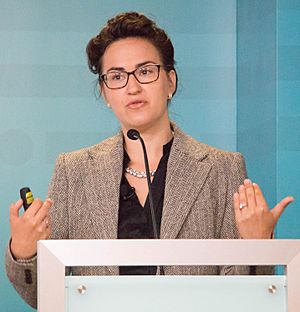Athena Aktipis facts for kids
Quick facts for kids
Athena Aktipis
|
|
|---|---|

Aktipis in 2017
|
|
| Education | Reed College – BA (psychology, 2002) University of Pennsylvania – MA (psychology, 2004) and PhD (psychology, 2008) |
| Occupation | Professor |
| Employer | Arizona State University |
| Known for |
|
Christina Athena Aktipis is a professor at Arizona State University. She studies how living things, from tiny cells to large groups of people, work together. She leads the Interdisciplinary Cooperation Initiative. She also helps direct the Human Generosity Project.
Professor Aktipis is an expert in how cooperation works in nature. She studies how living things evolve and how our minds work. She also researches cancer from a new angle. She has written books like The Cheating Cell: How Evolution Helps Us Understand and Treat Cancer. She also hosts a podcast called Zombified. This podcast explores the science behind how things can control us in everyday life.
Contents
Her Career Journey
Athena Aktipis studied psychology at Reed College, earning her first degree in 2002. She then went to the University of Pennsylvania. There, she earned her master's degree in 2004 and her Ph.D. in 2008. After that, she did special research at the University of Arizona. This research focused on how living things change over time.
From 2011 to 2014, she was a research professor at Arizona State University. During this time, she also worked at the Center for Evolution and Cancer. This center is part of the University of California, San Francisco. In 2013-2014, she was a special fellow in Berlin, Germany. When she returned, she helped start the Human Generosity Project. Since 2015, she has been a professor at Arizona State.
Cool Projects She Works On
Working Together in Tough Times
Professor Aktipis is part of a team called "Cooperation in the Apocalypse." This team studies how people act during big crises. For example, they looked at how people behaved during the COVID-19 pandemic. They asked questions about wearing masks and how people stayed healthy. They also studied how friendships changed during these times.
Teamwork Across Different Sciences
The ASU Interdisciplinary Cooperation Initiative brings together many smart people. They all want to understand how cooperation works. They hold meetings and workshops for professors and researchers. They also host a big meeting called the Cooperation and Conflict Symposium. This group helps different types of scientists work together. Professor Aktipis also hosts online talks with cooperation scientists.
The Human Generosity Project
A big part of Professor Aktipis's work is studying how humans help each other. She especially looks at how people are generous when others need help. She co-leads the Human Generosity Project. This project studies how our biology and culture affect generosity. They do this by studying people in different places. They also do experiments and use computer models.
How Tiny Germs Affect Us
Our bodies are full of tiny living things called microbes. These microbes can affect many parts of our behavior. In her lab, Professor Aktipis and her team study this. They explore how the microbiome (all the microbes in our bodies) might affect what we eat. They also look at how these microbes might influence how we act around others.
Kombucha and Microbes
Kombucha is a fizzy drink made from fermented tea. It's made by a team of bacteria and yeast working together. Professor Aktipis uses kombucha to study how microbes share resources. She also wants to see if this team of microbes can fight off bad germs. This helps her understand how different species cooperate.
Cancer and Cell Teamwork
Our bodies are made of billions of cells. These cells are like a society; they must work together. Cancer happens when some cells stop cooperating. Professor Aktipis studies cancer using this idea. She uses ideas from evolution and computer models. She also works with doctors to understand cancer better. Her work helps us see cancer as a breakdown in teamwork among cells.
Zombified Podcast
Professor Aktipis hosts an educational podcast called Zombified. In this podcast, she talks about how we can be influenced by things outside ourselves. She interviews experts from different fields. These fields include biology, psychology, and computer science. The podcast helps listeners understand forces that affect our behavior.
Channel Zed
During the COVID-19 pandemic, Professor Aktipis created Channel Zed. This is an online educational TV channel. It has interactive shows about how to survive and do well in tough times. It's a place where scientists, artists, and leaders share ideas. Channel Zed helps people think about big challenges. It also celebrates stories of strength and bouncing back. The channel covers current events, health, history, and culture.
 | Ernest Everett Just |
 | Mary Jackson |
 | Emmett Chappelle |
 | Marie Maynard Daly |

